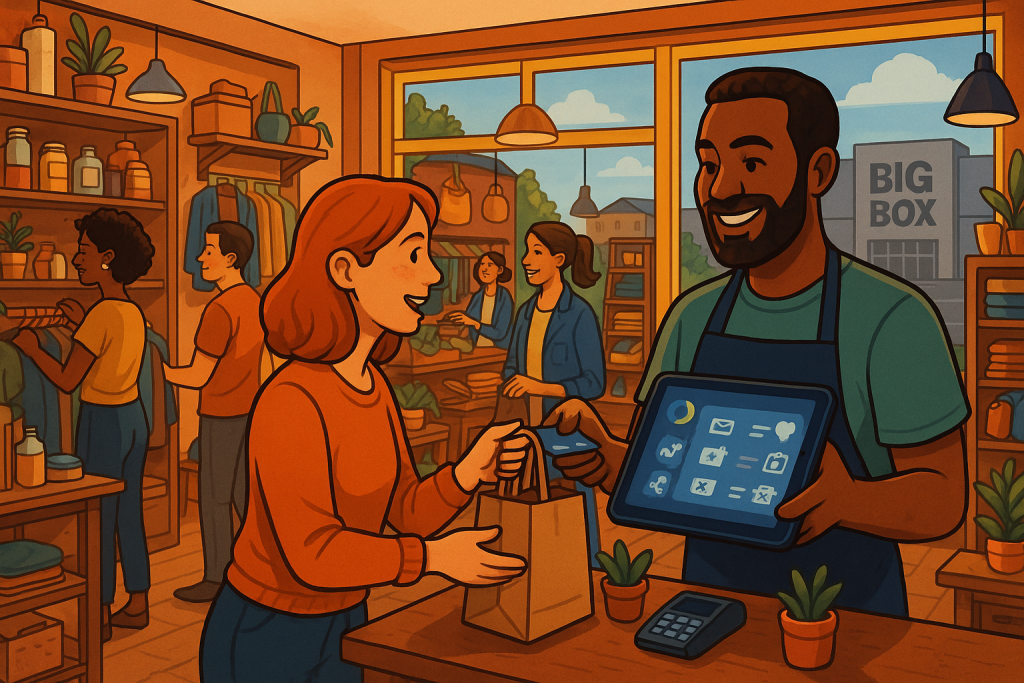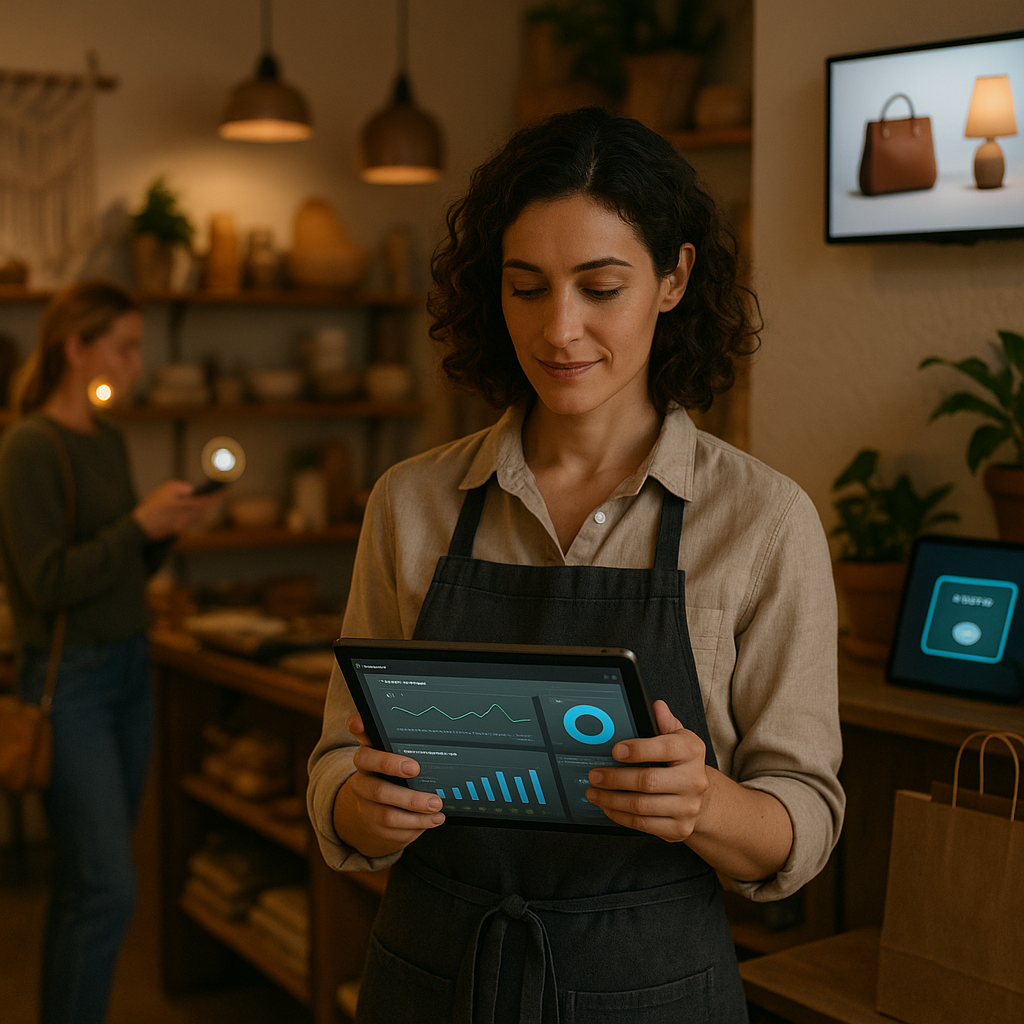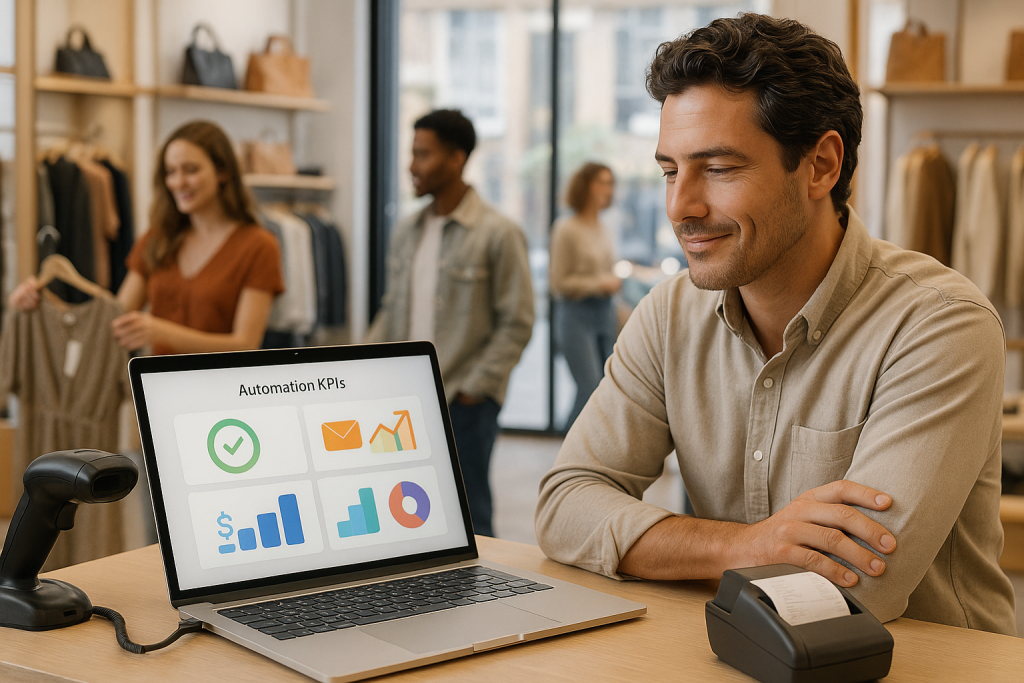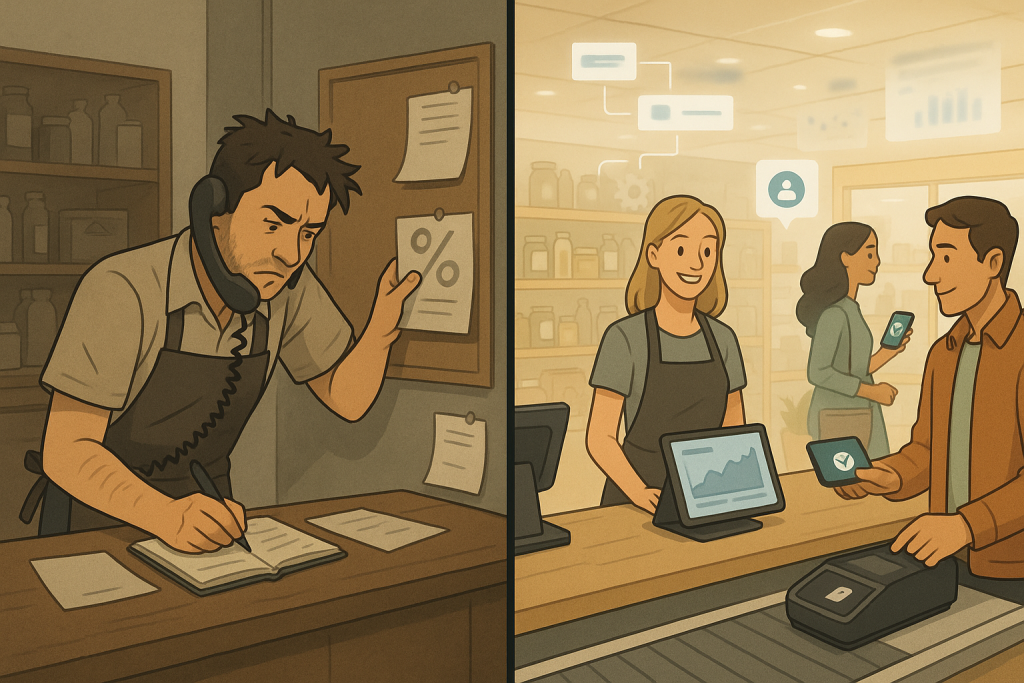After 38 years of helping businesses grow, I’ve witnessed the retail apocalypse predictions, the rise of Amazon dominance, and the supposed death of small retail. But here’s what the headlines miss: Smart small retailers aren’t just surviving—they’re thriving by leveraging automated marketing solutions that level the playing field in ways that were impossible just five years ago.
The $2.7 Million David vs. Goliath Success Story
Let me start with a story that perfectly illustrates how small retailers can compete and win. Last year, I worked with a family-owned outdoor gear store in Colorado with two physical locations and annual revenue of $2.1 million. They were struggling against not just Amazon, but also large sporting goods chains and direct-to-consumer brands.
Their challenges were typical of small retail:
- Limited marketing budget compared to big competitors
- No dedicated marketing staff or expertise
- Inability to compete on price alone
- Difficulty reaching customers beyond their immediate geographic area
- Lack of customer data insights for personalized marketing
- Time constraints preventing consistent marketing execution
Traditional marketing advice suggested they focus on “customer service” and “community connection”—generic strategies that weren’t producing measurable results.
Instead, we implemented a comprehensive automated marketing system. The results after 18 months:
- Online revenue grew from $180,000 to $890,000 annually
- Customer email list grew from 1,200 to 23,000 engaged subscribers
- Average customer lifetime value increased by 340%
- Marketing efficiency improved by 600% (revenue per marketing dollar)
- Total revenue increased to $2.7 million with same staffing levels
- Expanded customer base to include clients from 12 states
This wasn’t just growth—it was transformation from a local shop to a regional destination retailer that competed successfully against much larger competitors.
Why Traditional Small Retail Marketing Fails

Most small retailers approach marketing like it’s still 1995. They rely on newspaper ads, radio spots, basic websites, and hope for the best. Meanwhile, their customers have moved to digital channels where Amazon and large chains dominate through sophisticated, data-driven marketing systems.
The Resource Disparity Problem
Amazon spends over $20 billion annually on marketing and technology. Target spends $2 billion. Walmart spends $3.4 billion. Even mid-sized chains spend millions on marketing automation, data analytics, and customer targeting systems.
Small retailers typically spend $20,000-$100,000 annually on marketing, with no dedicated marketing staff and limited technology resources. This creates an impossible competitive disadvantage using traditional marketing approaches.
The Expertise Gap
Effective modern marketing requires expertise in:
- Email marketing automation and segmentation
- Social media advertising and optimization
- Search engine optimization and content marketing
- Customer data analysis and lifetime value calculations
- Conversion rate optimization and funnel management
- Multi-channel campaign coordination and measurement
Small retailers don’t have marketing teams with these specialized skills, and can’t afford to hire them individually.
The Consistency Challenge
Successful marketing requires consistent execution across multiple channels over extended periods. Small retailers get distracted by daily operations, seasonal demands, and crisis management, leading to inconsistent marketing that fails to build momentum.
How Automated Marketing Levels the Playing Field
Modern automated marketing systems give small retailers access to the same sophisticated capabilities that large companies use, but at a fraction of the cost and complexity.
Intelligent Customer Segmentation and Personalization
Automated systems analyze customer behavior, purchase history, and engagement patterns to create detailed customer segments:
- New customers receive welcome sequences with brand education
- Frequent buyers get VIP treatment and early access to sales
- Dormant customers receive re-engagement campaigns
- High-value customers receive personalized product recommendations
- Seasonal customers get targeted campaigns at optimal times
This level of personalization was previously only available to companies with million-dollar marketing budgets and dedicated data science teams.
Multi-Channel Campaign Orchestration
Automated marketing coordinates campaigns across email, social media, Google ads, retargeting, and in-store promotions:
- Email campaigns trigger corresponding social media content
- In-store purchases activate online retargeting sequences
- Abandoned cart emails coordinate with retargeting ads
- Social media engagement feeds into email segmentation
- Review requests automatically deploy after purchase completion
Predictive Analytics and Optimization
AI-powered systems predict customer behavior and automatically optimize marketing performance:
- Predicting which customers are likely to make repeat purchases
- Identifying optimal times to send marketing messages to individual customers
- Automatically adjusting ad spending based on performance data
- Predicting inventory needs based on marketing campaign performance
- Identifying customers at risk of churning before they leave
Case Studies: Small Retailers Beating Big Competitors

Let me share three detailed case studies that demonstrate how automated marketing transforms small retail operations:
Case Study 1: Fashion Boutique vs. Department Stores
The Business: A women’s fashion boutique with one location and $800,000 annual revenue, competing against department stores and online fashion retailers.
The Challenge: Customers would browse in-store but purchase similar items online for lower prices. Limited ability to compete on price or selection breadth.
The Automated Marketing Solution:
- Implemented personal styling recommendation engine based on purchase history
- Created automated email sequences featuring styling tips and outfit combinations
- Deployed social media automation showcasing customer photos and styling
- Set up abandoned cart recovery with personalized styling advice
- Created VIP customer program with exclusive access and personal shopping services
Results After 12 Months:
- Online sales grew from $45,000 to $280,000 annually
- Average transaction value increased by 65%
- Customer retention rate improved from 23% to 67%
- Social media followers grew from 800 to 12,000
- Overall revenue increased by 45% despite increased online competition
Key Success Factor: The boutique differentiated on personal styling expertise rather than price, using automation to scale personalized service that large competitors couldn’t match.
Case Study 2: Hardware Store vs. Home Depot
The Business: Family-owned hardware store with $1.2 million annual revenue, competing against Home Depot, Lowe’s, and Amazon for home improvement purchases.
The Challenge: Impossible to compete on price or inventory breadth. Customers used the store for advice but purchased online or at big box stores.
The Automated Marketing Solution:
- Created expert advice content library with automated delivery based on purchase patterns
- Implemented project-based email sequences (e.g., “Complete Kitchen Renovation Guide”)
- Set up automated seasonal reminders for maintenance tasks
- Created contractor loyalty program with automated invoicing and rewards
- Deployed local SEO automation to capture “near me” searches
Results After 18 Months:
- Contractor program grew to 180 regular customers
- Average customer frequency increased from 2.1 to 4.7 visits annually
- Online presence generated 35% of new customer acquisitions
- Revenue per customer increased by 85%
- Total revenue growth of 38% without expanding physical space
Key Success Factor: The store became the local expert resource, using automation to provide ongoing value that big box stores couldn’t match.
Case Study 3: Specialty Food Store vs. Grocery Chains
The Business: Gourmet food and wine store with $900,000 annual revenue, competing against grocery chains and online specialty food retailers.
The Challenge: Higher prices than grocery stores, limited convenience compared to chains, shipping costs disadvantage versus online competitors.
The Automated Marketing Solution:
- Implemented taste profile analysis with automated product recommendations
- Created educational content about food pairing and preparation
- Set up automated seasonal and holiday campaign sequences
- Deployed customer milestone recognition (anniversaries, birthdays)
- Created subscription box service with automated curation
Results After 15 Months:
- Subscription service generated $240,000 in annual recurring revenue
- Customer lifetime value increased by 190%
- Average basket size grew by 55%
- Email engagement rates exceeded industry averages by 340%
- Revenue growth of 42% with expanded customer base beyond local area
Key Success Factor: The store created an educational and experiential relationship with customers that automated systems scaled efficiently.
Give Your Customers the Personal Touch Amazon Can’t Match
Before implementing comprehensive automated marketing systems, let’s address one fundamental advantage you have over Amazon: personal customer service. But how do you scale that personal touch when you can’t afford to staff phones 24/7?
Get Your Custom AI Phone Agent for Retail – Built FREE
Imagine if every customer call to your store was answered by someone who knows your inventory, understands your customers’ preferences, and can provide personalized recommendations – even at midnight, even on holidays, even when you’re helping other customers in-store.
🛍️ Retail-Specific AI Phone Agent Features:
✓ Product Expert Knowledge – Trained on your inventory, brands, and customer preferences
✓ Personal Shopping Assistant – Provides recommendations based on customer needs and budget
✓ Inventory Availability – Real-time stock information and special order capabilities
✓ Store Hours & Directions – Helps customers find you and plan their visit
✓ Appointment Booking – Schedules personal shopping sessions and product consultations
✓ Customer Preference Memory – Remembers past purchases and preferences for returning customers
This is your competitive advantage over Amazon: personal service that actually knows your customers.
👉 BUILD MY RETAIL AI PHONE AGENT – FREE
No credit card required. Retail-trained AI ready in under 24 hours.
The Small Retailer’s Automated Marketing Advantage

Small retailers actually have several advantages over large competitors when using automated marketing effectively:
Agility and Personalization
Small retailers can implement changes quickly, test new approaches rapidly, and personalize customer experiences in ways that large companies’ bureaucratic processes prevent.
Authentic Brand Storytelling
Automated marketing amplifies authentic brand stories and owner personalities that resonate more powerfully than corporate messaging from large chains.
Local Market Expertise
Small retailers understand their local customers intimately. Automated systems can scale this local knowledge to serve larger geographic areas while maintaining personal touch.
Niche Specialization
Automated marketing allows small retailers to efficiently serve specialized niches that aren’t profitable for large competitors to target.
Implementation Strategy for Small Retailers
Successful automated marketing implementation for small retailers follows this progression:
Phase 1: Foundation Building (Weeks 1-4)
- Set up integrated customer database and email marketing platform
- Install website tracking and analytics systems
- Create basic automated email sequences (welcome, abandoned cart, post-purchase)
- Establish social media automation tools
Phase 2: Segmentation and Personalization (Weeks 3-8)
- Implement customer segmentation based on purchase behavior
- Create targeted email campaigns for different customer types
- Set up personalized product recommendation systems
- Deploy retargeting advertising campaigns
Phase 3: Advanced Automation (Weeks 6-12)
- Add predictive analytics for customer behavior
- Implement multi-channel campaign coordination
- Create seasonal and event-triggered campaign sequences
- Set up automated review and referral systems
Phase 4: Optimization and Scaling (Months 3-6)
- Analyze performance data and optimize campaign effectiveness
- Expand successful campaigns to new customer segments
- Add advanced features like subscription services or loyalty programs
- Scale successful strategies to larger audiences
Key Performance Indicators for Small Retail Automation

Small retailers should focus on these critical metrics:
Customer Lifetime Value (CLV): Target 150-300% improvement within 12 months through better retention and increased purchase frequency.
Email Revenue Attribution: Automated email marketing should generate 20-35% of online revenue for most small retailers.
Customer Acquisition Cost (CAC): Automation should reduce CAC by 40-60% through improved conversion rates and targeting efficiency.
Repeat Purchase Rate: Target improvement from typical 20-30% to 50-70% through automated retention campaigns.
Average Order Value: Expect 25-50% improvement through automated upselling and cross-selling.
Marketing ROI: Well-implemented automation should achieve 8:1 to 15:1 return on marketing investment.
Advanced Automated Marketing Features
Leading small retailers are implementing sophisticated automated marketing features:
Predictive Inventory Marketing: Systems that automatically promote products based on inventory levels and seasonal demand patterns.
Dynamic Pricing Optimization: Automated pricing adjustments based on demand, competition, and customer segments.
Cross-Channel Customer Journey Mapping: Systems that track customer interactions across all touchpoints and optimize the complete experience.
Automated Influencer and Partnership Management: Systems that identify and manage relationships with local influencers and complementary businesses.
AI-Powered Content Creation: Automated systems that create product descriptions, social media posts, and email content based on product data and customer preferences.
The Competitive Advantages of Marketing Automation

Small retailers using advanced automated marketing gain several key advantages:
David vs. Goliath Positioning: Automated systems allow small retailers to compete on sophistication rather than size, often providing better customer experiences than large competitors.
Operational Efficiency: Automation handles routine marketing tasks, allowing small teams to focus on high-value activities like customer service and product curation.
Scalable Growth: Automated systems enable revenue growth without proportional increases in staffing or operational complexity.
Customer Intelligence: Detailed analytics provide insights that improve decision-making across all business areas, not just marketing.
Market Expansion: Automation enables small retailers to efficiently serve customers beyond their traditional geographic boundaries.
The Future of Small Retail Success
The future belongs to small retailers who embrace technology to enhance their natural advantages rather than trying to compete on scale. Automated marketing is the great equalizer that allows small retailers to:
- Provide personalized experiences at scale
- Compete on customer service and expertise rather than price alone
- Build sustainable competitive advantages through customer relationships
- Achieve profitable growth without losing their entrepreneurial agility
Taking Action: Your Automated Marketing Roadmap

The retail landscape will continue evolving rapidly, with customer expectations rising and competition intensifying. Small retailers who implement automated marketing systems now will build sustainable competitive advantages, while those who delay will find themselves increasingly disadvantaged.
Your implementation strategy:
- Audit Your Current Marketing: Identify inefficiencies and missed opportunities in your current approach
- Define Your Unique Value Proposition: Determine what makes your store different and how automation can amplify those advantages
- Choose Integrated Systems: Select marketing automation platforms that work together seamlessly
- Start with High-Impact Basics: Implement fundamental automation that provides immediate returns
- Measure and Optimize: Use data to continuously improve your automated marketing effectiveness
- Scale Successful Strategies: Expand what works to larger audiences and new customer segments
Remember, Amazon and large chains have advantages in price and selection, but small retailers have advantages in personality, expertise, and customer relationships. Automated marketing systems amplify these natural advantages while eliminating the resource disadvantages.
The small retailers who are winning aren’t trying to be Amazon—they’re using technology to become better versions of themselves. The question isn’t whether you can compete with Amazon, but whether you’re ready to leverage automation to win in ways that Amazon can’t.
Your customers are waiting for the personalized, expert, relationship-driven experience that only small retailers can provide. Automated marketing systems give you the tools to deliver that experience profitably and at scale.
The future of retail isn’t about big versus small—it’s about smart versus traditional. Make sure you’re on the winning side.
Start Competing with Amazon Today – Get Your Free AI Phone Agent
While you’re building comprehensive automated marketing strategies, you can immediately compete with Amazon’s convenience by offering something they can’t: personalized phone service that actually understands your customers and your products.
🚀 Why Small Retailers Love Our AI Phone Agents:
✓ 24/7 Personal Shopping Service – What Amazon can’t offer: real product expertise available anytime
✓ Local Advantage Amplified – “We’re right here in your neighborhood and here’s what we have in stock for you today”
✓ Customer Relationship Building – Remembers preferences, past purchases, and special occasions
✓ Competitive Intelligence – Handles price comparisons professionally while highlighting your unique value
✓ Inventory Management – Connects customers with exactly what you have available
✓ Store Visit Encouragement – Converts phone calls into foot traffic and in-store experiences
Real Small Retail Success Stories:
- Boutique Clothing Store: Increased phone-to-visit conversion by 78% with AI assistance
- Specialty Electronics Shop: Reduced Amazon comparison shopping by 45% through expert AI consultation
- Gourmet Food Store: Generated $67,000 in additional annual revenue from after-hours AI phone service
The Amazon Advantage You Can Beat:
- Amazon: Algorithms and recommendations based on browsing data
- Your AI Agent: Personal shopping advice based on actual product knowledge and local preferences
- Amazon: Generic customer service that reads from scripts
- Your AI Agent: Knowledgeable assistant trained specifically on your products and customer base
- Amazon: Impersonal shopping experience
- Your AI Agent: Relationship-building conversations that create loyal customers
👉 GET MY FREE RETAIL AI PHONE AGENT NOW
Retail-expert AI that knows your products and builds customer relationships. Ready in under 24 hours. No credit card required.
Don’t let Amazon’s convenience beat your expertise. Combine the best of both worlds with AI-powered personal service that’s available 24/7.
Your customers want to support local businesses – make it easy for them by being available when they need you most.
